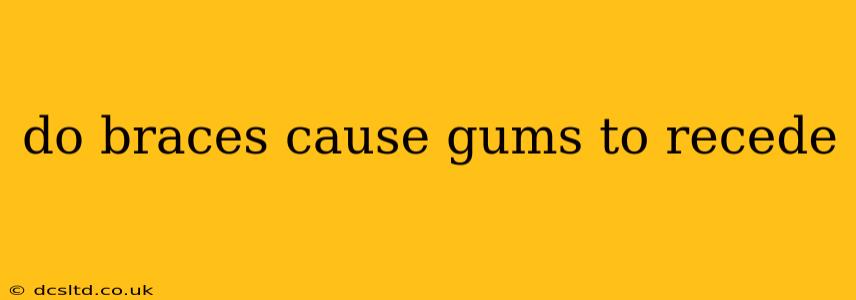The question of whether braces cause gum recession is a complex one, with no simple yes or no answer. While braces themselves don't directly cause gum recession, certain orthodontic procedures and individual factors can contribute to this issue. Understanding the nuances is crucial for managing expectations and ensuring optimal oral health during and after orthodontic treatment.
What is Gum Recession?
Before diving into the relationship between braces and gum recession, let's define the term. Gum recession refers to the pulling back of the gums, exposing more of the tooth's root. This can lead to several problems, including increased tooth sensitivity, tooth decay, and potential tooth loss. It's a prevalent dental concern, and its causes can be multifaceted.
Can Braces Cause Gum Recession? The Factors Involved
While the appliances themselves don't directly cause gum recession, several factors related to orthodontic treatment can contribute:
1. Poor Oral Hygiene:
This is perhaps the most significant contributing factor. Inadequate brushing and flossing allow plaque and bacteria to accumulate along the gum line. This leads to gingivitis (gum inflammation) and, if left untreated, periodontitis (gum disease), a major cause of gum recession. The presence of braces makes meticulous oral hygiene even more critical, as food particles can become trapped around the brackets and wires.
2. Aggressive Brushing:
While thorough brushing is essential, aggressive brushing with a hard-bristled toothbrush can damage the gums and accelerate recession. This is true regardless of whether you have braces. Gentle brushing techniques are crucial, especially with braces, as the brackets and wires can make the gums more susceptible to injury.
3. Irritation from Brackets and Wires:
The brackets and wires of braces can sometimes irritate the gums, leading to inflammation and, potentially, recession if not addressed promptly. Regular checkups with your orthodontist are vital to identify and address any irritation. They may adjust the wires or provide wax to reduce friction and discomfort.
4. Underlying Gum Disease:
Pre-existing gum disease can worsen during orthodontic treatment. If gum disease is present before braces are applied, it's crucial to address it before starting treatment. This often involves professional cleaning and potentially other treatments to improve gum health.
How to Minimize the Risk of Gum Recession with Braces
Several strategies can help minimize the risk of gum recession during orthodontic treatment:
Maintaining Excellent Oral Hygiene:
This includes brushing twice daily with a soft-bristled toothbrush, flossing carefully (using floss threaders if necessary), and using an antimicrobial mouthwash as recommended by your dentist or orthodontist.
Regular Checkups with Your Orthodontist and Dentist:
Regular visits allow for early detection and treatment of any gum irritation or problems.
Proper Brushing Technique:
Learn and consistently employ the correct brushing technique to avoid damaging your gums. Your dentist or hygienist can show you the best technique for brushing around your braces.
Addressing Underlying Gum Disease:
If you have pre-existing gum disease, ensure it's treated effectively before beginning orthodontic treatment.
Does Invisalign Cause Gum Recession?
Invisalign, a clear aligner system, generally carries a lower risk of gum recession compared to traditional braces because the aligners don’t directly contact the gums in the same way that brackets do. However, maintaining impeccable oral hygiene remains paramount, as plaque buildup can still lead to gum problems.
In Conclusion
While braces themselves do not directly cause gum recession, certain factors related to orthodontic treatment and individual oral health habits can contribute to it. By prioritizing meticulous oral hygiene, attending regular checkups, and using proper brushing techniques, you can significantly reduce the risk of gum recession during and after orthodontic treatment. If you have any concerns about your gums during orthodontic treatment, consult your orthodontist or dentist immediately.
